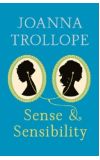
29 Oct 2013 04:43:09
Trollope knows Sense and Sensibility inside out, faithfully follows the plot and retains all the most important scenes, which are ingeniously reworked. Her contemporary parallels are fresh and funny. The Dashwood women are expelled from their family home, not because of entailed property devolving to the male heir but because the second Mrs Dashwood and her husband never got around to getting married, and so their three daughters (Ellie, M and Mags) have no legal rights. Rather than arch-villain or "shag-bandit" Willoughby (Wills) impregnating then abandoning a teenager, as in the original, he introduces "Little Eliza" to drugs, and she languishes in a crack den.
M's rejection by Wills is compounded by her being trolled on YouTube, so that the whole world can witness her humiliation. Sir John Middleton is transposed to a bumbling, warm-hearted Johnnie Boden figure who sells quality clothing to the middle classes. Robert Ferrars is a gay party-planner. Nancy Steele has hair-extensions and plastic surgery. Trollope has clearly had enormous fun with her updating, and part of the delight for the reader is wondering what she's going to do next. How will she deal with secret engagements, social indiscretions and Marianne's brush with death?
M is asthmatic and prone to depression. The depression is a neat touch, but one that is regrettably not fully worked through. Her near-fatal collapse is caused by an asthma attack, whereas Austen's self-obsessed, hysterical, highly emotional heroine suffers a horrific mental and physical breakdown brought on by her excessive sensibility: "Had I died, it would have been self-destruction," she says. Austen was making serious points about the relationship between 19th-century sensibility and depression, including self-harm, which has striking parallels with modern-day mental illness, particularly among teenage girls. This seemed like a lost opportunity. I wanted to see more evidence of Marianne's despair than her playing Taylor Swift songs on her guitar.
Nowhere else in Austen's novels do we see a heroine in the grip of an ill-fated erotic passion. Marianne's anguish is real, protracted and painful to read. M doesn't reach the complexity and emotional depth of Marianne, a girl who is rude not for the sake of rudeness but because she wants to slice through her era's stultifying social mores and hypocrisy: "I have erred against every commonplace notion of decorum; I have been open and sincere where I ought to have been reserved, spiritless, dull and deceitful." The least interesting thing about Marianne is her beauty; what matters are her intelligence (sense), her sensitivity (sensibility) and her brooding intensity.
That said, Trollope's strength as a writer has always been her sharply observed characters and authentic dialogue. Like Austen, she is especially good on the way women behave badly to other women. Her Fanny Dashwood is a tour de force of nastiness and selfishness, and she brings the vague Mrs Dashwood (Belle) to life. Austen's rather sketchy depiction of Edward Ferrars and Colonel Brandon (a deliberate ruse to make the gorgeous Willoughby even more alluring?) is here transposed to more fully fleshed out and rounded characters.
If the Austen Project intends to bring new (young) readers to Jane Austen, I have no doubt that it will succeed. Trollope has set the bar high for the other novelists (including Val McDermid and Curtis Sittenfeld). Her Sense & Sensibility is a superb gateway into the original novel. One of the many reasons Austen's novels endure is that they are still relevant. Young women today may have equal job opportunities and no longer have to view marriage as a career step, but they still yearn for love, security, companionship and relationships of equals. So my verdict is – as Mags Dashwood would say – "Totes Amazeballs".

